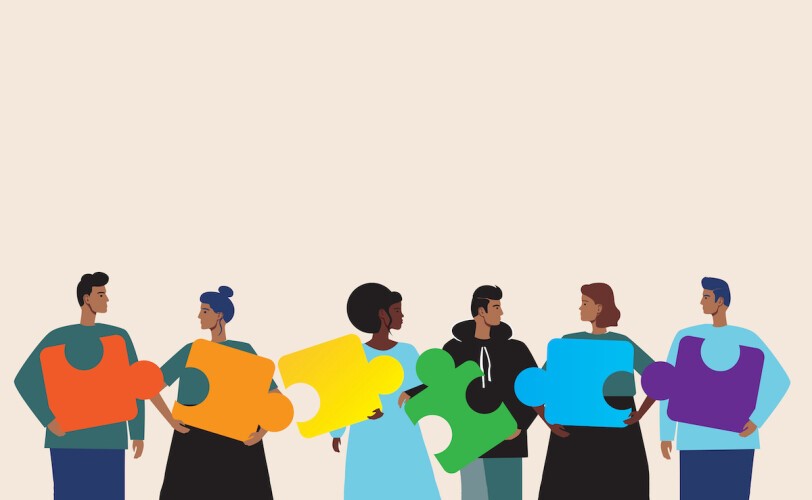
Belonging to the LGBTQ+ community can be a source of strength and pride, but it can also present unique challenges. For example, many folx in the LGBTQ+ community experience mental health difficulties, with bisexual, transgender, and younger members reporting higher rates of mental health concerns including depression, anxiety, PTSD, substance abuse, and attempted and completed suicide. Folx belonging to additional marginalized communities such as those in the BIPOC (Black, Indigenous, and People of Color) community face even higher rates of mental health concerns, with a study by the HRC finding that LGBTQ+ high schoolers of color were more likely to attempt suicide than white LGBTQ+ high schoolers and non-LGBTQ+ high schoolers.
Seeking support can also feel daunting, due to mistrust, concerns about possible discrimination, and a lack of cultural awareness amongst mental healthcare providers. Here are some points to consider when searching for LGBTQ+ affirming mental healthcare:
What therapist and why you choose them will be a deeply personal experience. Consider the following, prior to contacting a provider/practice:
- Do your research – Read biographies and reviews. Note if a therapist’s profile lists their pronouns – if so, this could be an encouraging sign that the provider/practice affirms the client’s gender identity and expression. There may be other sections on the profile or website explaining the provider’s commitment to diversity and inclusion.
- Do you want a therapist who is a member of the LGBTQ+ community and may be better able to understand your experiences firsthand?
- Are you looking to work with a therapist holding a certain gender identity?
- Are you open to working with a therapist who isn’t a member of the LGBTQ+ community but is an educated, culturally-humble, and affirming ally?
- Do you want to work with a therapist who shares other aspects of your identity or experience (e.g., race/ethnicity, religion, disability) and understands intersectionality?
- Do you want a therapist with expertise and training in a particular therapy approach, such as Eye Movement Desensitization and Reprocessing (EMDR), Dialectical Behavior Therapy (DBT), or with particular issues such as trauma or substance abuse?
- Is the level of education, licensure or certification important to you?
What are the next steps?
After you’ve identified the attributes you’re looking for in a clinician you may want to work with, it’s time to connect with them and schedule your appointment. Pro-tip: come prepared for that first session! Your initial intake is as much as an interview of you, as it is your interview with your therapist. It is a discussion that continues throughout the therapeutic process, as you are not only processing what your therapist says, but also what they do and how they make you feel.
Here’s some information you may want to ask your therapist about themselves or their work:
- What is their approach to therapy, and specifically what is their approach to the concerns you may have or areas of growth you want to explore?
- What is their experience working with the LGBTQ+ community? What experience do they have working with clients that share your specific identities?
- Are they well-versed in issues involving gender identity, sexuality, coming out, self-esteem, and other common presenting problems for LGBTQ+ folx?
- Do they have any certifications or training related to mental healthcare for the LGBTQ+ community?
- How long have they been practicing and what settings have they practiced in?
- Do you have any questions about their biography that you do not understand?
- Are they engaged in therapy or do they have their own space for mental health support? (You want your therapist to take care of themselves as they are taking care of you, right?)
- What are their fees? Is there a sliding scale rate? Are there fellows or therapists who may charge lower rates?
- What is their availability and cancellation policy?
Take your time developing your therapeutic alliance with your therapist. Pay attention to your experiences when engaging with your therapist.
- Do you feel seen, understood and supported in all of your identities?
- Is your therapist attentive to your needs and curious about your experiences and perspective?
- Do you feel your therapist has appropriate boundaries?
You have a right to choose with whom you share such vulnerable information about your life, insecurities, fears, pain, and happiness. You also have a right to change this decision and choose another therapist at any time. Finding an LGBTQ+ affirming therapist takes time and effort, but it can make a significant, positive impact on your mental health.
_________________________________________
This blog is authored by Naomi Gargiulo, MSW, LSW. IntraSpectrum Counseling is Chicago’s leading psychotherapy practice dedicated to the LGBTQ+ community, and we strive to provide the highest quality mental health care for multicultural, kink, polyamorous, and intersectional issues. For anyone needing affirming and validating support in their healing, please click here or email us at help@intraspectrum-chicago.com.





 Today, July 26th, is National Disability Independence Day. This annual commemoration marks the day in 1990 when the Americans with Disabilities Act (ADA) was signed into law. The ADA enshrined several crucial civil rights protections for individuals with disabilities, but it still falls short of its intended goals after over 30 years on the books.
Today, July 26th, is National Disability Independence Day. This annual commemoration marks the day in 1990 when the Americans with Disabilities Act (ADA) was signed into law. The ADA enshrined several crucial civil rights protections for individuals with disabilities, but it still falls short of its intended goals after over 30 years on the books.